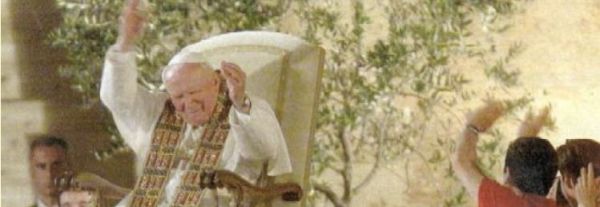1. After meditating on the eschatological goal of our existence, that is, eternal life, we now reflect on the journey that leads to it. To do this, we develop the perspective presented in the Apostolic Letter Tertio millennio adveniente: “The whole of the Christian life is like a great pilgrimage to the house of the Father, whose unconditional love for every human creature, and in particular for the ‘prodigal son’ (cf. Lk 15:11-32), we discover anew each day. This pilgrimage takes place in the heart of each person, extends to the believing community and then reaches to the whole of humanity” (n. 49).
In fact, what Christians will one day live to the full is already in some way anticipated today. Indeed, the Passover of the Lord inaugurates the life of the world to come.
2. The Old Testament prepares for the announcement of this truth through the complex theme of the Exodus. The journey of the chosen people to the promised land (cf. Ex 6:6) is like a magnificent icon of the Christian’s journey towards the Father's house. Obviously there is a fundamental difference: while in the ancient Exodus liberation was oriented to the possession of land, a temporary gift like all human realities, the new “Exodus” consists in the journey towards the Father’s house, with the definitive prospect of eternity that transcends human and cosmic history. The promised land of the Old Testament was lost de facto with the fall of the two kingdoms and the Babylonian Exile, after which the idea of returning developed like a new Exodus. However, this journey did not end in another geographical or political settlement, but opened itself to an “eschatological” vision that was henceforth a prelude to full revelation in Christ. The universalistic images, which in the Book of Isaiah describe the journey of peoples and history towards a new Jerusalem, the centre of the world (cf. Is 56-66), in fact point in this direction.
3. The New Testament announces the fulfilment of this great expectation, holding up Christ as the Saviour of the world: “When the time had fully come, God sent forth his Son, born of woman, born under the law, to redeem those who were under the law, so that we might receive adoption as sons” (Gal 4:4-5). In the light of this announcement, this life is already under the sign of salvation. It is fulfilled in the coming of Jesus of Nazareth, which culminates in the Passover but will have its full realization in the “parousia”, the final coming of Christ.
According to the Apostle Paul, this journey of salvation which links the past to the present, directing it to the future, is the fruit of God's plan, totally focused on the mystery of Christ. This is the “mystery of his will, according to his purpose which he set forth in Christ as a plan for the fullness of time, to unite all things in him, things in heaven and things on earth” (Eph 1:9-10; cf. Catechism of the Catholic Church, 1042f.).
In this divine plan, the present is the time of the “already and not yet”. It is the time of salvation already accomplished and the journey towards its full actualization: “Until we all attain to the unity of the faith and of the knowledge of the Son of God, to mature manhood, to the measure of the stature of the fullness of Christ” (Eph4:13).
4. Growth towards this perfection in Christ, and therefore growth towards the experience of the Trinitarian mystery, implies that the Passover will be fulfilled and fully celebrated only in the eschatological kingdom of God (cf. Lk 22:16). But the events of the Incarnation, the Crucifixion and the Resurrection already constitute the definitive revelation of God. The offer of redemption which this event implies is inscribed in the history of our human freedom, called to respond to the call of salvation.
Christian life is a participation in the paschal mystery, like the Way of the Cross and the Resurrection. It is a Way of the Cross, because our life is continually subject to the purification that leads to overcoming the old world marked by sin. It is a way of resurrection, because, in raising Christ, the Father conquered sin, so that for the believer the “justice of the Cross” becomes the “justice of God”, that is, the triumph of his truth and his love over the wickedness of the world.
5. In short, Christian life is growing towards the mystery of the eternal Passover. It therefore requires that we keep our gaze on the goal, the ultimate realities, but at the same time, that we strive for the “penultimate” realities: between these and the eschatological goal there is no opposition, but on the contrary a mutually fruitful relationship. Although the primacy of the Eternal is always asserted, this does not prevent us from living historical realities righteously in the light of God (cf. CCC, n. 1048f.).
It is a matter of purifying every human activity and every earthly task, so that the Mystery of the Lord’s Passover will increasingly shine through them. As the Council in fact reminded us, human activity which is always marked by the sign of sin is purified and raised to perfection by the paschal mystery, so that “when we have spread on earth the fruits of our nature and our enterprise — human dignity, brotherly communion, and freedom — according to the command of the Lord and in his Spirit, we will find them once again, cleansed this time from the stain of sin, illuminated and transfigured, when Christ presents to his Father an eternal and universal kingdom” (Gaudium et spes, n. 39).
This eternal light illumines the life and the entire history of humanity on earth.
[Pope John Paul II, General Audience 11 August 1999]












